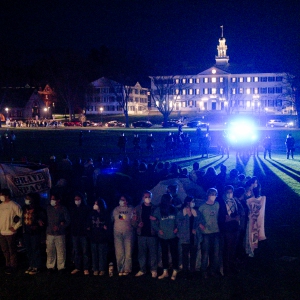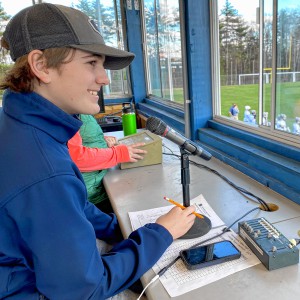Granite Geek: 28 years after an ‘e-mail course’ a professor ponders changes to online courses

Cover of the August 28, 1995, business section ot the Nashua Telegraph. DAVID BROOKS—Monitor staff
| Published: 04-22-2024 3:03 PM |
More than 28 years ago I interviewed Kenneth Levasseur, a professor at UMass-Lowell, about his innovative new project: A math class via email.
In the resulting column I noted that the course, the school’s first official online class, would have students answer questions sent by Levasseur, use email to “pepper him with questions and comments” and put together a “software notebook to demonstrate their knowledge.”
In 1995, it was news that a nearby university (I was working in Nashua at the time) offered a credit class via the Internet in any form since schools were just starting to tiptoe into remote education. The online behemoth SNHU, still called New Hampshire College back then, only offered its first Web class that fall.
I had interviewed Levasseur for a column in the weekly “computer news” version of the Business section in the Nashua Telegraph. I found a copy of the section recently while cleaning out the attic and was amused to see that it included a “listing of events this week on America Online, Compuserve, eWorld and Prodigy,” a one-panel comic titled Compu-Toon, and a story headlined “Poll: Happy people use the Internet.” That’s not a headline you’d see today.
On a whim, I looked up Levasseur only to find that at 74 he is still teaching at Lowell with a course in discrete math and a class intriguingly titled “mathematical problem solving.” I was curious what he thought of a quarter-century’s evolution in online college education.
My 1995 column was pretty upbeat, ending with “education is definitely an area where the online world is going to make a big difference, a difference for the better.” In the bright glow of the early Web, it seemed possible that most colleges would eventually move online, creating a virtual education space that would be cheaper, more accessible and superior in some vague futuristic way than the bricks-and-mortar system.
But despite his innovation at Lowell, Levasseur wasn’t all-in with this optimism at the time. And he remains a bit dubious.
“I’m guessing it’s probably not going to increase that much more, at least in math,” he said in an interview last week. After years of experimenting with various online systems, his current courses are in person.
Article continues after...
Yesterday's Most Read Articles
 Franklin police arrest man after accidental shooting Wednesday
Franklin police arrest man after accidental shooting Wednesday
 Update: Reactions for, against the more than 100 arrested at Dartmouth, UNH
Update: Reactions for, against the more than 100 arrested at Dartmouth, UNH
 Kenyon: What makes Dartmouth different?
Kenyon: What makes Dartmouth different?
 Concord High graduate leads Pro-Palestine protests at Brown Univeristy
Concord High graduate leads Pro-Palestine protests at Brown Univeristy
 High schools: Wednesday’s baseball, softball, lacrosse and tennis results
High schools: Wednesday’s baseball, softball, lacrosse and tennis results
 Spring sprouts downtown: outdoor dining, farmers market, First Friday
Spring sprouts downtown: outdoor dining, farmers market, First Friday
The issue, Levasseur said, is the same now as was in the beginning: How to balance out the value of talking in-person.
Even his 1995 class, a continuing-education course on the software Mathematica, included five in-person sessions during the semester. While this was far less than the minimum for courses without e-mail interaction, it still required driving to campus and sitting in a room with strangers, something many geeks work hard to avoid.
“I think face-to-face will always be important,” he told me at the time. “I don’t think e-mail is suitable for all courses. I can’t see teaching a philosophy course this way, or even a calculus course.”
When I talked to him last week he acknowledged that this last comment was ironic since UMass-Lowell now offers a slew of calculus online as well as several philosophy courses. Two decades of improvement in technology, boosted by institutions that were forced to exist online during the pandemic shutdown, has made a big difference.
“How many of us would have thought of Zoom and all these other ways of administering courses?” he said. He pointed to Perusall, which allows multiple online note-taking and interaction on research papers or other material, as an example of tech getting closer to real-life interaction.
Closer but not the same, hence the in-person classes. He noted that his office hours, when he’s available for students to drop by and talk one-on-one, are accessible through Zoom yet most students still come by in person.
Levasseur’s original course ran for several years. Over the decades UMass-Lowell has slowly expanded online courses, going through software changes, debating synchronous vs. asynchronous, and adjusting to the streaming world. But many of the initial questions are still around.
Of particular concern for teachers, Levasseur said, is the relative difficulty of motivating people online.
“That kind of thing is very successful where people are motivated to learn as opposed to getting credits,” he said, but “the people who have to take a class as a requirement for a degree – calculus, stats, any number of different math classes – we find that too many take shortcuts and just not ready to take online classes, even with the pandemic experience.”
Our chat ended up sounding like conversations about work-from-home, debating the merits of internet convenience versus the benefit of human interaction. And unless you think technology is going to meld the online world with what we used to semi-jokingly call “meatspace,” as visual-reality firms want to do, I think this debate will continue for a long time.


 New Hampshire jury finds state liable for abuse at youth detention center and awards victim $38M
New Hampshire jury finds state liable for abuse at youth detention center and awards victim $38M Jurors hear closing arguments in landmark case alleging abuse at New Hampshire youth center
Jurors hear closing arguments in landmark case alleging abuse at New Hampshire youth center Voice of the Pride: Merrimack Valley sophomore Nick Gelinas never misses a game
Voice of the Pride: Merrimack Valley sophomore Nick Gelinas never misses a game
